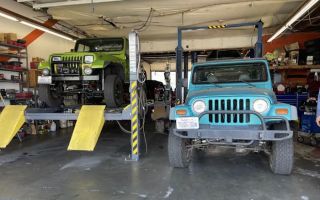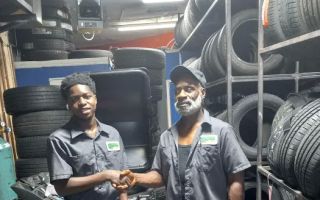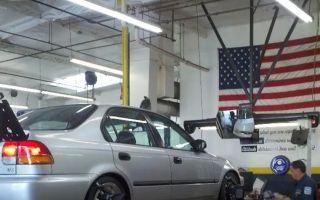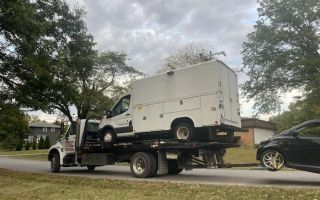Understanding Dead Car Batteries and the Need for Roadside Assistance
We've all experienced it at some point: you're ready to head out, start your car, and—nothing happens. The dreaded "click-click" sound or a completely dead dashboard is a frustrating sign that your car battery may be dead. While it's an issue that's easy to overlook, understanding why batteries die and how to effectively handle the situation with the help of roadside assistance is essential for every car owner.
Dead batteries can be caused by a variety of factors, from leaving your headlights on overnight to an aging battery that no longer holds a charge. The good news is that with proper knowledge and the help of roadside assistance services, you can quickly resolve this situation without the need to tow your vehicle. In this article, we’ll walk you through how to jumpstart your car, when to call for roadside assistance, and why it’s a crucial service for your peace of mind on the road.
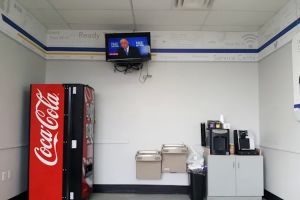
NTB-National Tire & Battery
6315 Prentiss School Dr, Canal Winchester, OH 43110, USA
Step-by-Step Guide to Jumpstarting a Dead Car Battery
When you're in a hurry and your car won't start, jumpstarting it can feel like a daunting task. However, it’s a simple process that can be done safely with the right equipment and knowledge. Here’s how you can jumpstart your car on your own with the help of roadside assistance or using jumper cables:

Pep Boys
1200 W Washington Blvd, Los Angeles, CA 90007, USA
1. Safety First: Ensure the Correct Setup
Before attempting to jumpstart your car, make sure you're in a safe environment. Turn off both vehicles, engage the parking brakes, and make sure the vehicles are in neutral or park. Always wear gloves and eye protection to avoid potential injury from sparks or battery acid.
2. Gather the Right Tools
You’ll need a set of jumper cables and a vehicle with a charged battery (the "donor" vehicle). Make sure the cables are in good condition and that both car batteries are in the proper position for connecting the cables.
3. Connect the Jumper Cables Correctly
Start by connecting the positive (red) jumper cable to the positive terminal of the dead battery, followed by connecting the other end of the red cable to the positive terminal of the working battery. Next, connect the negative (black) jumper cable to the negative terminal of the working battery, and attach the other end to a metal part of the engine or frame on the dead car. This helps reduce the risk of sparks near the battery.
4. Start the Donor Vehicle and Charge the Dead Battery
Start the engine of the donor vehicle and let it run for a few minutes. This allows the working battery to charge the dead battery. It’s important not to start the car with the dead battery right away, as it can put a strain on both batteries.
5. Attempt to Start the Dead Vehicle
After a few minutes, try starting the vehicle with the dead battery. If it doesn’t start, wait a few more minutes before trying again. If it still doesn’t work, there may be other issues with the car's electrical system.
6. Disconnect the Cables Safely
Once the car starts, remove the jumper cables carefully, reversing the order in which you connected them. First, disconnect the negative cable from the metal part of the car, then the negative cable from the donor vehicle, followed by the positive cables. Make sure the cables do not touch each other while removing them.
When to Call for Roadside Assistance
While jumpstarting a car is a valuable skill, there are times when calling for professional roadside assistance is the best option. Here are a few situations where it’s smarter to leave the task to experts:
1. If You’re Uncertain or Uncomfortable
If you're unsure about how to safely jumpstart your car or don’t have the necessary equipment, it’s always best to call for roadside assistance. These professionals are trained to handle these situations quickly and safely, ensuring there is no damage to your vehicle.
2. If Your Car Still Won’t Start After a Jump
Sometimes, even after a successful jumpstart, your car may not stay running. This could indicate a deeper issue, such as a failing alternator or electrical system problem. Roadside assistance can help you determine whether the issue is with the battery or another part of your vehicle.
3. When You Need Additional Services
Roadside assistance services typically offer more than just jumpstarts. From tire changes to lockout assistance, they can provide comprehensive help to get you back on the road quickly. It’s a great service to have for complete peace of mind while driving.
The Importance of Roadside Assistance Coverage
Having roadside assistance coverage is incredibly valuable for every driver, especially if you frequently find yourself in situations where your car battery dies. This service provides more than just convenience—it gives you a reliable lifeline during emergencies. Many car insurance policies include roadside assistance, or you can purchase it as an add-on. Here’s why it’s worth considering:
1. Quick Response Time
Roadside assistance services often offer quick response times, meaning help is just a phone call away when you're stranded. This is especially important if you're in an unfamiliar area or facing inclement weather.
2. Comprehensive Services
In addition to jumpstarting your car, roadside assistance can help with flat tires, fuel delivery, towing, and even lockouts. It’s an all-in-one solution for many car problems.
3. Cost-Effective Peace of Mind
Rather than paying for individual services like towing or jumpstarting on an as-needed basis, investing in roadside assistance coverage provides ongoing peace of mind for a relatively low cost. It’s one of the best ways to protect yourself from unexpected car problems.
Conclusion: The Benefits of Roadside Assistance and Car Battery Maintenance
Knowing how to jumpstart a dead car battery is an invaluable skill that can save you time and frustration when your vehicle’s battery fails. However, there are times when it’s better to rely on roadside assistance, particularly if you're unsure of the process or if the jumpstart doesn't work. Roadside assistance is a comprehensive service that ensures you're never alone when facing a car problem.
To learn more about how roadside assistance can help you in these situations and explore our range of services, visit Rescue & Towing. Ensure your car’s battery stays charged and your peace of mind stays intact—because every driver deserves it.


